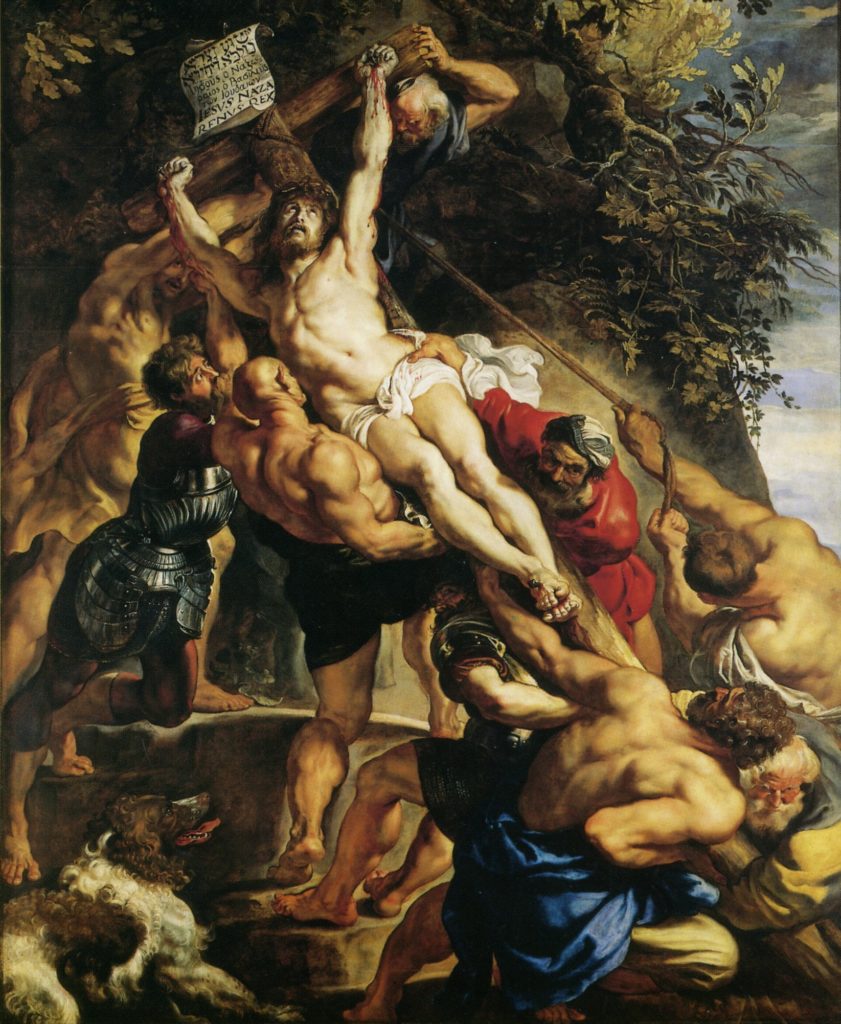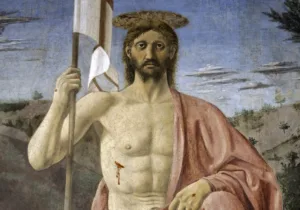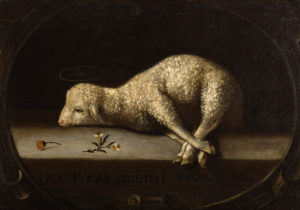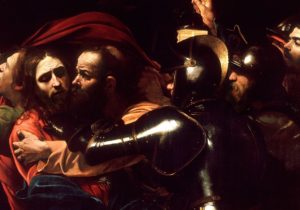And just as Moses lifted up the serpent in the wilderness, so must the Son of Man be lifted up, that whoever believes in him may have eternal life. ‘For God so loved the world that he gave his only Son, so that everyone who believes in him may not perish but may have eternal life.’
St. John’s description of the crucifixion of our Lord is dramatically paralleled in the Flemish painter Peter Paul Ruben’s The Elevation of the Cross, a triptych completed between 1610-1611 (Rubens did a second version in 1638). In the central panel a confused mass of kinetic energy is on display as at least nine men conglomerate into a struggling tangle of limbs and torsos as they fight to raise Jesus and the lumber of the cross. It is a profoundly dramatic, if doubtful, scene. Doubtful because Christ is impossibly heavy. The variety of figures attempting to raise him—from some thickly-roped with muscle like circus strongmen, to soldiers, to elderly men in varying dress—suggest that additional recruits had to be conscripted impromptu to help those originally tasked with the job. On this point, Rubens’ is taken to be gesturing to the culpability that all humanity shares in the death of Christ. You. And me. And even my daughter making breakfast in the next room.
The impossible weight of the crucified Christ, however, is my main interest here. There are at least two explanatory options, I think, that might account for this phenomenon—or three, I suppose, if you think it’s possible that Rubens was just a dunce. I think we can dispatch with the third idea. Another, then, is historical and pedagogical. In the midst of the Protestant and Catholic violence of his day, Rubens’ image visually asserted especially Catholic theology. While The Elevation is now displayed in the Cathedral of Our Lady in Antwerp, Belgium, it originally was in the Church of St. Walburga, where it hung above the main altar. There, it would have been associated with the central function of the altar—the raising up, or elevatio, of the Eucharistic wafer during which it is miraculously transubstantiated into the literal body of Christ. The shocking physicality of Rubens’ image and the exaggerated weight of Jesus would remind congregants that the lifting of the wafer is, in reality, no easy thing—it is the raising up of the Son of God entire.
The second plausible explanation for the impossible weight of Rubens’ Jesus is more speculative, but no less poetic. There is in Hebrew a particularly excellent word: kavod (K-B-D, כבד). It is a complex term with layers of meaning and attending symbolism. It is used nowadays to praise someone for the performance of an act worthy of respect. When a friend and I hiked up the Snake Path to the top of Masada, the ancient fortification in southern Israel, and met our friends who had taken the gondola, our Israeli guide—who had been against our making the trek on foot given the temperature and terrain—was apparently won over by our speed and (what he took to be!) our hearty resilience. “Kavod!” he said to us with an appreciative nod. This usage gets to kavod’s primary meaning of “glory” or “honor.” But there is an earlier, not unrelated, root meaning of kavod that means “weight.”
C.S. Lewis appears to make something out of this etymological connection in his wonderful essay, “The Weight of Glory.” While he never explicitly mentions the Semitic tie between “weight” and “glory,” it is latent throughout. In reflecting on the idea of glory for humanity, Lewis, at first, suggests discomfort with what he sees as a focus on personal glory among some Christians—John Milton, Thomas Aquinas, and St. Paul among them; a good crowd indeed, but still capable of error. Lewis tells us his worry is that their focus on glory has its roots in vanity, something, he says, is more “of hell … than of heaven.” But as ruminates further he begins to realize that the scriptural intent behind the pursuit of glory is not self-admiration but, rather, that achieving glory is synonomous with achieving “good report with God, acceptance by God.” He writes:
No one can enter heaven except as a child; and nothing is so obvious in a child—not in a conceited child, but a good child—as its great and undisguised pleasure in being praised. Not only in a child, either, but even in a dog or a horse…What I had mistaken for humility had…prevented me from understanding what is in fact the humblest, the most childlike, the most creaturely of pleasures[:] …the lawful pleasure of praise from those whom it was my duty to please.
Lewis realizes “that nothing can eliminate from the parable the divine accolade, ‘Well done, thou good and faithful servant.’” We were made to be pleasing to God, and it is only in being the kind of being that does in fact please God that we can flourish—for one can flourish only when it is, or is becoming, that which it was made to be. Lewis then draws “glory” and “weight” together:
The promise of glory is the promise, almost incredible and only possible by the work of Christ, that some of us, that any of us who really chooses, shall actually survive the examination, shall find approval, shall please God. To please God…to be a real ingredient in the divine happiness…to be loved by God, not merely pitied, but delighted in as an artist delights in his work or a father in a son—it seems impossible, a weight or a burden of glory which our thoughts can hardly sustain. But it is so.
This kavod, this weight of glory, is of profound importance in a culture increasingly disengaging from the transcendent. The American revolutionary ideal of equal dignity under law was not grounded, as some now insist, in the unrestrained primacy of individual license. The Founders grounded their Declaration reclaiming inalienable rights in the very fact that the duties owed by all human beings to all other human beings were revealed in the natural law revealed and endowed upon humanity by the Creator as a part of being made in His image. It is in this fact that such things as the “pursuit of happiness” can have any real meaning. The Founders were not asking for unfettered access to a gassy kind of happiness that can be found in whatever sort of inclination suits our individual or collective fancy. “Happiness”, which was understood in Greco-Roman and Judeo-Christian terms to mean “flourishing,” can only happen for human beings in a very limited, quite precise, moral ecology.
Relating to all this, sometime back, one of Providence’s original co-publishers, Robert Nicholson, lamented what he perceives as the hollowing out of human being. I’ve lost the notes and can’t reconstruct his argument entirely, but Robert was essentially mourning the loss of individual integrity, of ballast, of kavod. His musings brings me again to Catholic thinker Gil Baillie, whose work I discussed yesterday in my Maundy Thursday reflections, who illuminates such observations in his exploration of what Henri de Lubac called the “waning of ontological density.” It’s a high-caloric phrase, but ontology is simply the study of what it means to be—or, to be human beings. Humanity’s spiritual predicament, in de Lubac’s assessment, is that we are hollowing ourselves out by abandoning a Christ-centered understanding of what it means to be a human being in the first place. Cutting ourselves off from this “ontological mooring” warns Baillie, results in a “liberal self” that gluts itself on whatever pleases our own appetites, free from “the idea of a common good and any hierarchy of public goods.” We were not made for this kind of diet. Malnourished, our lives become increasingly disordered and dysfunctional and we suffer from an “unbearable lightness of being.”
In his Weight of Glory essay, Lewis suggested that human beings are “far too easily pleased.” We are “half-hearted creatures,” he suggests, “fooling about with drink and sex and ambition when infinite joy is offered us.” These can be true—and even appropriate—sources of modest joys, but, ultimately, the joy we really seek is a joy that can only come when we seek to be that for which we were made. Christ, in the garden, sweat blood as he sought a way to avoid the fate before him. But in the end he submitted to the divine will for it was for that will that he lived. And it was only in carrying out that will that his life could have gravity—a gravity so dense that nine well-muscled men could hardly lift it.
As with Christ, so it is with us. But this is an old story we remember this Good Friday. Like Christ, we find our life only when we lose it.
Finally, if I might suggest it, as with people so too, if more analogously, with nations. Nations also have vocations. The rich intelligence of Christian thinking about politics is grounded in the nature of right sovereignty—proper authority—which is a role distinguished not by privilege nor merely position but by responsibility. Governments, Romans 13 reminds us, were established by God to maintain the justice, order, and peace of the political community, to be a terror to those who do evil, to punish wrongdoing, to do good where able.
Seen this way, exceptional nations, perhaps, are not those nations with a unique calling—for the scriptural mandate applies to all—but those nations that have, over time, habituated in themselves the disposition and gathered together the power to meet its responsibility not just for its own people and its own good but, where and when it is prudential to do so, for the wider world as well. Exceptional nations, then, are not those who seek glory for their own—poisonous—self-admiration, but because it is the right thing to do. Such a disposition is harmonious with our interests—for the cultivation of a reputation for national virtue is both its own reward and might, just might, yield a bounty of respect among nations, of kavod, that renders our power more sufferable to those who are beneath it.
In any event, even if nations were not be eligible for Divine praise, the individuals who run them are. We can administer the affairs of state as individuals who seek to go our own—hollow—way, or as those who tether ourselves to the transcendent and find ballast in His good purposes.
Heavy stuff, indeed.
—








 Sponsor a student for Christianity & National Security 2024
Sponsor a student for Christianity & National Security 2024